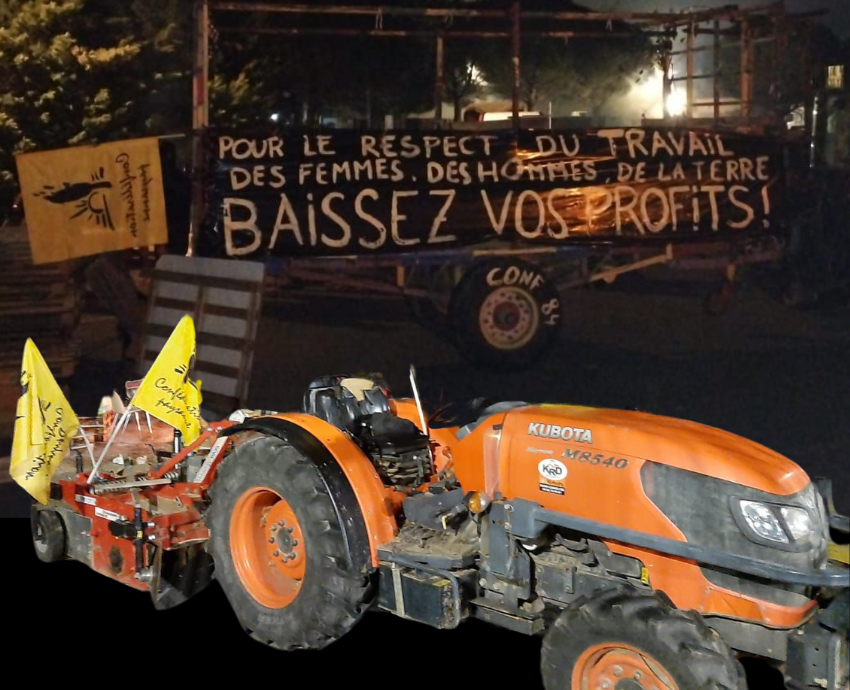
As French President Emmanuel Macron’s government, under new Prime Minister Gabriel Attal, moves ever further to the right, a radical mass movement is again shaking the country.
Last year, the biggest workers’ movement for decades mobilised millions across the country in an attempt to defend retirement pensions. This year it is the turn of the farmers to revolt.
Six thousand tractors were present at 120 blockades, and at least 16 motorways were brought to a standstill on January 30. Regional government headquarters have been covered with manure, and hypermarket distribution centres — as well as Toulouse airport — paralysed.
A column of two hundred tractors from the south headed for Paris on January 31, intending to blockade the main wholesale food market in Rungis. In every town they passed through, locals expressed support and brought food. "Sieges" of Paris and Lyon have been announced.
France has more than 400,000 farmers, compared with 100,000 in Britain. Over four decades, farmer income has fallen in real terms by 40%, and a quarter of French farmers live below the poverty line. Sheep farmers, cattle farmers and fruit producers, in particular, are often extremely poor.
This, along with unsocial hours and isolation, can have tragic consequences. Statistics show that at least two farmers commit suicide each week on average.
Slogans painted on the barricading tractors vary, including "I love my work, but I need to earn a living", "We shouldn’t import food whose production is banned in France", “Cattle farmers, wine producers, vegetable growers, one struggle!”, and “We want decent prices, not subsidies!”.
Radical action works. The government has already made concessions, reducing taxes on tractor fuel, increasing compensation to cattle farmers hit by disease, and promising to put a little more pressure on the big supermarket chains, who use their market power to pay criminally low prices. However, this is not enough, and the vast majority of farmers are determined to continue the movement.
We must not see farmers as a homogeneous bloc. The largest farmers’ federation, the Fédération Nationale des Syndicats d'Exploitants Agricoles (FNSEA), is dominated by owners of huge farms. The farmers’ movement can put forward either progressive or reactionary demands.
The left should support moves to guarantee minimum prices for producers and to cut into the mega profits of the food and supermarket industries. But other demands, such as for the abolition of the new rule that 4% of land must be left fallow at any one time, to help restore biodiversity, and similar calls to scrap green regulations, must be opposed.
Defend green options
There are three major national farmers’ federations. The biggest, the FNSEA — which got 55% of the vote in the 2019 elections to choose farmers’ representatives — has a leadership who are hoping that the government will concentrate on scrapping green regulations and raising agricultural subsidies, which benefit the biggest farms above all.
In contrast, the left-wing Confederation Paysanne (20% of the votes) is putting forward demands for minimum selling prices and lower profits for agribusiness and supermarket chains. The Confederation says blockades should be mostly aimed at supermarket chains.
Meanwhile, both federations are protesting new European Union treaties that aim to reinforce the dictatorship of the market and allow imports into Europe that are not subject to the same environmental and animal welfare rules as locally produced goods.
Macron is hesitating before sending the riot cops in, since the farmers have often been solid conservative voters. His interior minister even declared “We do not respond to suffering by sending in riot police” — which must be surprising news to the many strikers, anti-racists and ecologists maimed by police on demonstrations in recent years.
Farmers interviewed in the media said they were confident the police sympathise with them. This is likely to change as the actions go on, and armoured vehicles were in place around Paris on January 31, while 15 farmers were arrested near Rungis.
The situation is changing every day. The most radical major workers' union, the CGT, has called on its activists to attend farmers’ pickets and blockades and discuss common interests. The radical left La France Insoumise (France in Revolt) also supports demands to freeze the profit margins of the supermarket chains and impose minimum pricing. In some towns, left-wing mayors have organised meetings in support.
But some on the left mistakenly refuse to support the movement because of the right-wing domination of the main farmers’ federation.
This week’s radical tactics were inspired by the Yellow Vest movement of a few years back, and by last year's pensions protests, which were particularly spectacular in smaller provincial towns with a solid conservative tradition.
More and more of the distribution centres of supermarket chains are being targeted as days go by, and this is a welcome development. With a major one-day teachers’ strike planned, a taxi drivers’ protest growing and bus drivers’ strikes in the offing, let’s hope the farmers’ example leads to more generalised revolt.
[John Mullen is an anti-capitalist activist in the Paris region and a supporter of La France Insoumise. His website is randombolshevik.org.]